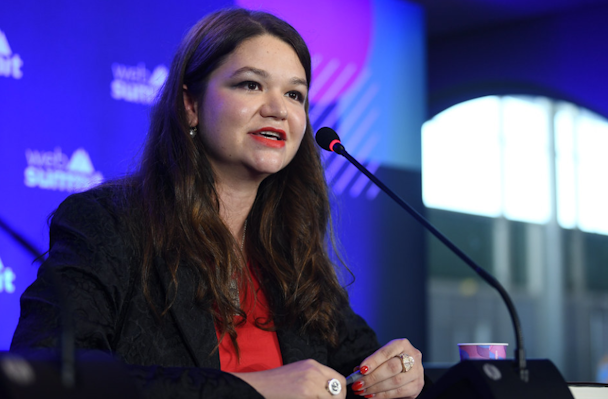Cambridge Analytica whistleblower: 'Twitter's politics ban isn't a long-term fix'
Brittany Kaiser, the former Cambridge Analytica business development director-turned-whistleblower, has conceded that while Twitter's political ad ban is a brave move it's not a long-term fix.

Along with Christopher Wylie, Kaiser shone a spotlight on the nefarious practices of her ex-employer in 2018
Kaiser is instead pushing for a technical solution to stop the spread of fake news, as well as campaigning for people's right to have greater ownership of the information stored on them by businesses like Facebook.
She described Twitter boss Jack Dorsey's decision last week to halt all paid-for political campaigning on Twitter as "heroic" in the face of their being "no other solutions" for tracking and tracing political misinformation and discrimination online.
"Though as a political activist myself, I don't think it's a permanent fix," she caveated during a press conference at Web Summit on Tuesday (5 November).
"We need political advertising in order to get people registered to vote. We need political advertising to get people to the polls, we need it to get people to care about issues that they're normally apathetic about."
"It's sad to see that we've come to the point where we need to ban political advertising in order to protect people from being manipulated, but we do. I really hope that executives at big tech companies can make the investments they need to in order to protect us for the foreseeable future."
Along with Christopher Wylie, Kaiser shone a spotlight on the nefarious practices of her ex-employer in 2018 after it was revealed to have mined the information of 87 million Facebook profiles to influence elections.
She is now warning that unless political ads and discourse are policed on platforms like Facebook voters in the 2020 US elections will be as "unprotected as they were in 2016".
“I say this because in 2016 I was there, my colleagues worked the campaigns and I saw how things were done," she added. "What I saw was weaponization designed to get people like me, women and minorities, to step away from the ballot box, not to vote."
The whistleblower (who was a central figure in Netflix's recent documentary The Great Hack which exposed the inner workings of Cambridge Analytica) is currently spearheading a campaign called Own Your Data.
The initiative is demanding that Facebook pay users for the value their personal information generates and asking it to also hand over other "fundamental" data and property rights.
She was also fiercely critical of Mark Zuckerberg's defense of Facebook's political ad policy ahead of its Q3 earnings call last week; in which the chief executive refused to "pull back on free expression" and revealed that political campaigns accounted for just 0.5% of its revenues.
Kaiser said she didn't believe Zuckerberg would ban paid-for political speech without "being forced to".
"I hope by the time he comes around to it, there are technological solutions that mean good political advertising, positive political advertising can still be allowed," she continued.
For its part, Facebook has upped the transparency it offers to voters around who is buying political ads, launching an ad archive that lets people see how much individuals, groups or political parties have spent.
In the past 18 months, it's also rolled out controls which require people buying ads around political causes to verify their identity. 'Paid for' disclaimers must also run adjacent to any political ads.
Brands, ethics and data
Where Twitter has issued a ban on political advertising entirely Facebook is still facing heat from regulators and politicians about both its data practices and its role in democracy as major votes loom in the UK and US.
However, answering a question posed by The Drum Kaiser agreed that businesses and advertisers - like social networks - also have a role to play in being more "ethical" about how they gather people's data.
"Large corporations and companies around the world can make the ethical decision themselves to have a more transparent relationship with their consumers," she said.
"If you work in data-driven science and communications, you'll know that the majority of your budget actually goes to purchasing and listening data - matching it and hygiening it - in order to have information on your consumers.
"What brands could actually do instead is reach out to that consumer directly," Kaiser added, saying that giving customers the option to opt-out and review whether data was still relevant would be a more principled and efficient way of doing business.
"If you offer a positive incentive [through the likes of] rewards programmes, then I guarantee you customers will help you cut out that time spent and investment in buying your data elsewhere by giving you it directly."
She said that as a consumer, and even after seeing how the cogs worked at Cambridge Analytica, she didn't have a problem sharing data.
"I just want the companies to be honest about what they're collecting, what they're targeting me with, and why, and it's then we'll start to see a much more ethical landscape in the commercial space."
Advertisers' role in funding the likes of Facebook has previously been lambasted by Oberserver journalist Carole Cadwalladr, who led the reporting on the Cambridge Analytica scandal.
Speaking at Cannes Lions in June, the reporter called out the ad ecosystem for investing in the social media platforms she would accuse of undermining democracy.
“It’s really funny being here in the heart of the ad industry and seeing the yachts, the money and the beach clubs – while its central, central role in what’s going on here is being ignored,” she said at the time.
Accusing the adtech yachts parked in Le Viex Port of “monetising a total surveillance apparatus” that was “exploiting [people] in invisible ways,” Cadwalladr said the lack of discussion around the issue on Cannes Lions’ main stage was “depressing”.

